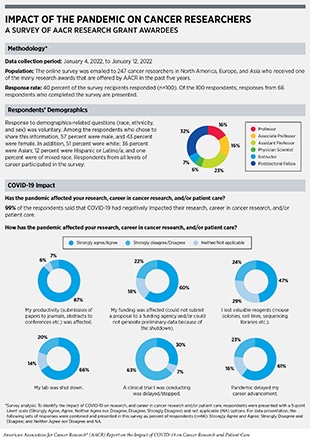A Message from the AACR
This is an uncertain time for everyone around the world, including those of us working in the field of cancer science and medicine and the patients and families who rely on us. In the United States and globally, there has been remarkable progress against cancer over the past few decades. However, our ability to continue the current pace of progress is in jeopardy because of the enormous global public health challenge posed by Coronavirus Disease 2019 (COVID-19). Because of their expertise in viral biology, immunology, mRNA vaccines, and therapeutic development, cancer researchers and physicians around the world have been deployed to the front lines of the COVID-19 pandemic to help mitigate this scourge that has already caused over 289 million cases and over 5.4 million deaths globally. The AACR Report on the Impact of COVID-19 on Cancer Research and Patient Care presents current evidence on the burden of COVID-19 among patients with cancer and highlights the challenges as well as future opportunities created by the pandemic in cancer research and patient care.
Patients with cancer have been especially vulnerable to COVID-19. Those with hematologic cancers as well as patients receiving B cell-targeted therapeutics are not only at a markedly higher risk for COVID-19, but also have shown poor responses to the available vaccines. There are grave concerns among public health experts that the delays in cancer screening, diagnosis, and treatment caused by the pandemic will have significant negative effects on outcomes for patients. There are particularly serious concerns for racial and ethnic minorities and other medically underserved populations because these groups already experience cancer health disparities and have shouldered a disproportionate burden of COVID-19. The stark disparities in the burden of COVID-19 have refocused the nation’s attention on the inequities in health care, and it is critical that everyone play a role in eradicating the social injustices that are barriers to health equity.
All stakeholders in the medical research community have come together and responded in innovative ways to continue cancer research and patient care despite the severe disruptions caused by COVID-19. Remarkable changes in the conduct of clinical trials have been implemented, many of which should persist beyond the pandemic. The changes are designed to ensure a patient-centric approach and to enhance patient safety and experience while improving clinical trial efficiency and outcomes. Some of the changes have the potential to improve long-standing challenges in clinical research, by enhancing enrollment of patients in cancer clinical trials, overall, as well as by increasing participation from racial and ethnic minorities and other medically underserved populations. Another opportunity in patient care that has been brought into focus during the pandemic is telemedicine. According to some practicing oncologists, the equivalent of decades of progress in facilitating the implementation, uptake, and access of telehealth has been made in months. These adaptations were driven largely by necessity and the commitment from all stakeholders in the medical research community to safely continue patient care during the pandemic. Moving forward, it will be critical to maintain and facilitate access so that telehealth care can be delivered equitably to all patients.
While we have witnessed unprecedented global collaborations and unparalleled progress in the face of a global pandemic, the past two years have also presented unique challenges to the medical research community. As one example, there has been a rapid proliferation of scientific and medical misinformation. Misinformation can bring serious harm to patients, communities, and populations. The medical research community must combat misinformation through increased public education and awareness. It is also important to explain that scientific evidence evolves over time as new data become available. Another challenge brought on by the pandemic is its multifaceted adverse impact on the cancer research and care workforce, especially on early-stage investigators, women, and underrepresented minorities. According to a recent AACR survey, nearly 100 percent of the respondents reported severe interruptions in their research and career advancements during the past two years.
With profound thanks to the entire cancer community, AACR has remained steadfast in its mission of preventing and curing all cancers through high-quality research, dissemination of scientific knowledge, public education, and science policy throughout the pandemic. Combating the pandemic head-on, AACR brought together some of the greatest scientific minds at the first-ever conference on COVID-19 and cancer in July 2020 and a follow-up conference in February 2021 to discuss the rapidly emerging data in basic, clinical, and epidemiologic research related to COVID-19 and cancer. Mobilizing our membership, AACR created a special COVID-19 and Cancer Task Force and hosted patient advocate forums to identify barriers and develop solutions to optimizing cancer care during the crisis. By pioneering scientific conferences, publishing groundbreaking science and policy articles many of which were inspired by the Task Force, and funding meritorious cancer research, AACR has proudly catalyzed the advancement of research on COVID-19 and cancer during these tumultuous times.
It is imperative that cancer researchers continue to contribute their unique expertise to combat the ongoing challenges of COVID-19. We must also keep in the forefront of our minds that there are many patients with cancer who are urgently awaiting more effective treatment options. Ensuring that medical research remains a priority for our nation’s policy makers is essential if we are to reestablish the momentum against cancer, revitalize the economy, and help the United States to maintain its position as the global leader in medical research. Therefore, the AACR urges Congress to continue to invest in medical research and the health care workforce, expand access to quality health care that includes telehealth, strengthen and modernize cancer clinical trials, and rebuild the U.S. public health infrastructure to better prepare us for any pandemics that may arise in the future. These actions will ensure that we continue on the path of accelerating lifesaving progress for patients with cancer around the world.

Antoni Ribas, MD, PhD, FAACR
AACR President, 2020-2021
Chair, AACR Report on the Impact of COVID-19 on Cancer Research and Patient Care Steering Committee
Chair, AACR Task force on COVID-19 and Cancer

Margaret Foti, PhD, MD (hc)
Chief Executive Officer
On behalf of the AACR Report on the Impact of COVID-19 on Cancer Research and Patient Care Steering

